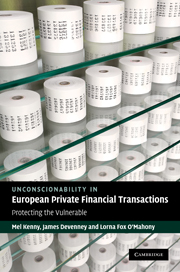Book contents
- Frontmatter
- Contents
- List of contributors
- Introduction: conceptualising unconscionability in Europe
- PART I Conceptualising unconscionability
- 1 Freedom of contract as freedom from unconscionable contracts
- 2 Protection of weaker parties in English law
- 3 Freedom of contract, unequal bargaining power and consumer law on unconscionability
- 4 Loyalty as a tool to combat contractual unfairness: a French perspective
- 5 Unconscionability and the value of choice
- 6 From individual conduct to transactional risk: some relational thoughts about unconscionability and regulation
- 7 An economic perspective on legal remedies for unconscionable contracts
- PART II Conceptualising unconscionability in financial transactions
- Conclusions
- Index
- References
5 - Unconscionability and the value of choice
from PART I - Conceptualising unconscionability
Published online by Cambridge University Press: 06 August 2010
- Frontmatter
- Contents
- List of contributors
- Introduction: conceptualising unconscionability in Europe
- PART I Conceptualising unconscionability
- 1 Freedom of contract as freedom from unconscionable contracts
- 2 Protection of weaker parties in English law
- 3 Freedom of contract, unequal bargaining power and consumer law on unconscionability
- 4 Loyalty as a tool to combat contractual unfairness: a French perspective
- 5 Unconscionability and the value of choice
- 6 From individual conduct to transactional risk: some relational thoughts about unconscionability and regulation
- 7 An economic perspective on legal remedies for unconscionable contracts
- PART II Conceptualising unconscionability in financial transactions
- Conclusions
- Index
- References
Summary
Introduction
What is the proper way to justify the doctrine of unconscionability? Should we understand the doctrine as a device by which the state bails people out of poor and uninformed choices they make in their agreements with each other? As a device against some forms of exploitation and in support of individual autonomy? As a redistributive device? As a means for improving efficiency? These perspectives may occasionally overlap in practice, but they are sufficiently distinct in principle. The choice among them will determine not just how the argument in favour of the doctrine ought to be made, but also the range of objections that this argument will need to meet. The aim of this chapter is to explain why making that choice has been a difficult task for contract theory and to offer an alternative justification of the doctrine of unconscionability, which I believe merits independent consideration.
Some threshold difficulties
Compared to the notions of ‘duress’, ‘undue influence’ or ‘misrepresentation’, the notion of ‘unconscionability’ is harder to unpack. Whereas the former notions give us some immediate glimpse of what is wrong with enforcing an undertaking, e.g. that one party to that undertaking has been put under some sort of illegitimate pressure or has been misled into agreeing, the notion of unconscionability tells us considerably less. On the face of it, all it signifies is that it would be ‘against conscience’ to insist on enforcing a certain undertaking or, from the point of view of our institutions, to actually enforce it.
- Type
- Chapter
- Information
- Unconscionability in European Private Financial TransactionsProtecting the Vulnerable, pp. 79 - 98Publisher: Cambridge University PressPrint publication year: 2010



